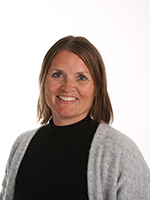Tasks performed
- Programme coordinator, Master of Science in Sport Management
- Responsible for the following courses
Background
Solveig Straume is Associate Professor in Sport Management.
She holds a PhD in Sport Science (2013) from the Norwegian School of Sport Sciences (NIH). She has her graduate degree (Cand Mag) from NIH and Volda University College (HVO), and her Master's degree from NIH.
She started as a PhD student in sports history at NIH in 2006, and has since then been working with teaching and supervision in higher education, first at NIH, and since 2012 at Molde University College (HiMolde). She have been responsible for nearly 15 different courses at both BSc and MSc levels.
Straume have supervised student theses’ at both BSc and MSc levels as well as supervised teacher assistants that have been involved in her courses.
From 2016 to 2018 she was Vice Rector for education at HiMolde.
Since 2018, she have been program coordinator for the master's program in Sport Management at HiMolde.
Research interests and supervision:
Straume's research have mostly centred around the broad field of sport for development and peace (SDP).
She holds a PhD in Sport History from the Norwegian School of Sport Sciences (NIH) (2013) with the dissertation "'Sport for All' in new settings: a study of the Norwegian Confederation of Sports' Sport for All projects in Tanzania in the 1980s and Zimbabwe in the 1990s". In particular she researched official sport policies and how these were translated and given meaning in local contexts in the Global South.
Straume have recent publications about SDP funding in a post-pandemic world and about SDP as part of higher educational programs. Currently she is working on a research project concerning international sports volunteers in SDP.
She is interested in questions related to sport and inclusion, broadly defined, and her research has for instance included gender issues in sport and physical activities (in relation to girl-conscious urban planning) and the inclusion of immigrants and low-income groups into sport.
Topics of particular interest:
- Sport for Development and Peace
- Sport and inclusion
- Sport policy and politics
- Gender issues in sport
- Sport history
- Urban development
- Dual career
- Sport and sustainability
Ongoing research projects:
- Sport for development and peace – Local perspectives - Funded by HiMoldes research fund
- Inclusion through physical and creative activities? - Funded by HiMoldes research fund
Previous research projects:
- ERASMUS+, ELCAMP (Sport Entrepreneur Bootcamp for Athletes) Project
- ERASMUS+, GETZ project.
- Football and inclusion - Funded by the UEFA HatTrick Investment Programme through the Football Association of Norway
